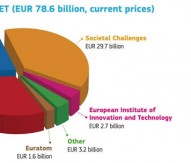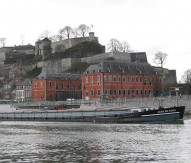

© Ministry of Science, Education and Sports
A small country for big brains
Croatia will formally accede to become the 28th EU member state on 1 July 2013. The new opportunities the country will receive cannot be underestimated, including closer ties with existing EU member states and R&D opportunities to benefit from European research and innovation funding, particularly the next EU framework programme. In its run-up to membership, Zagreb is already closely working with Brussels to implement Horizon 2020.
Croatia’s success rate in obtaining funding under FP7 was far below the EU average. As Minister of Science, Education and Sports, Željko Jovanović is now fully focused on bridging this gap as Croatia formally integrates into the Union.
How would you evaluate Croatia’s participation in FP7?
Although the success rate of Croatian applications under FP7 is 17.25%, i.e. below the EU average of 21.77%, Croatian scientists have succeeded in attracting, through these applications, funding of little more than €59m. This constitutes 38% more money than the Croatian contribution to the FP7 scheme so far which clearly shows the quality of our scientific community.
What major changes will EU membership bring to Croatia’s participation to Horizon 2020?
Key changes have already occurred – Croatian representatives, including the scientific attaché at the Croatian mission in Brussels, are actively involved in defining the ‘boundary conditions’ of establishing, financing and implementing Horizon 2020. Moreover, as a member state, Croatia will harmonise further its scientific and economic policies to those of the EU, which should boost further our success rates in participating and contributing to the Horizon 2020 programmes and projects.
What specific steps is Croatia taking to gain greater funding under Horizon 2020 compared to FP7?
In July 2012, we amended the act on the Croatian Science Foundation. The foundation is finally in the process of becoming the central independent seat for the national financial instruments to support scientific projects and activities. Consequently, this is a strong boost to the transition from state management to state supervision of the scientific sector in Croatia. An increase of the size and relevance of the scientific projects, support to excellent researchers and projects, set-up of national user labs, establishment of a matching funds scheme for EU framework programmes, installation grants for young scientists and synergies with the Unity through Knowledge Fund (UKF – a good example of collaboration of our scientists inland and those abroad) are only some of the provisions implied in the new act. All of this should promote our success in attracting funds from Horizon 2020. Moreover, the ‘action plan for increasing the absorption capacities of Croatia in participating to the EU framework programmes 2013-2015’ defines a further set of measures aimed at this goal.
As a new EU member state, what challenges will Croatia face when integrating its scientific and research community with other EU countries?
The biggest challenge is that Croatia devotes only 0.75% of its GDP to R&D activities, which is far below the average of EU member states, which is currently at 2.03%. Moreover, contrary to what happens in the most developed EU countries, the majority of these funds (i.e. 55%) are public expenditure. This is, obviously, due to a large extent to the structure of the Croatian economy where 92% of all companies are micro-companies and have an average of 1.9 employees. It is clear that this structure presents a very limited innovation and R&D investment potential. However, what is encouraging is that in the last five to six years, in absolute terms, the sum of money devoted to scientific activities, including scientific projects, junior researchers, the Croatian Science Foundation, FP7 national contributions, scientific conferences, national scientific journals and books, is at a constant level of €75m per year.
If Croatia were to be successful in Horizon 2020, what results would you like to witness?
The most important result will be the development of our society and economy with positive repercussions to the wellbeing of the everyday lives of all citizens of Croatia. In fact, in all activities the key aspirations of our ministry are: responsibility and accountability, transparency with clear and consequent criteria, competitiveness, efficiency, quality, priority setting and implementation, polycentric development of Croatia, social dimension and social inclusiveness of education and science as well as internationalisation and mobility. With the help of our EU colleagues and through networking with them, we hope that the levels of accountability and social responsibility of Croatian science will be significantly raised, thus actively contributing to the stated goals.
On the verge of accession to full membership of the EU, Croatian science and higher education are facing several challenges, but also fascinating opportunities. The Ministry of Science, Education and Sports, and I as the minister, see our role in this process as a service to the students and the academic community. The ministry can only set-up the pace of some measures and policies, but their successful implementation in promoting Croatia as a ‘small country for big brains’ can only happen if a large portion of all relevant stakeholders get actively involved in all the phases of this process. The ministry is sincerely convinced that the large majority of the Croatian society shares this aspiration.
Željko Jovanović


